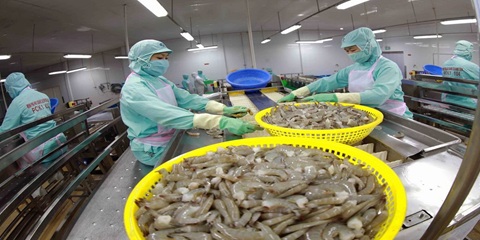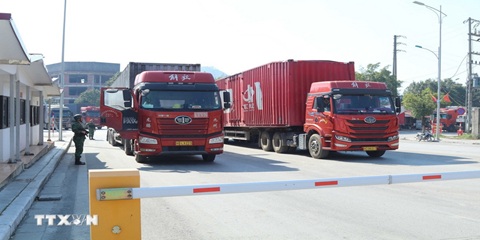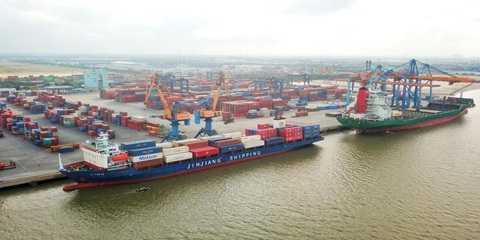Want to be in the loop?
subscribe to
our notification
Business News
VN NEEDS TO IMPROVE REGULATORY FRAMEWORK TO INCREASE GREEN FINANCING
Việt Nam needs to develop a proper regulatory framework to pave the way for credit institutions to increase green financing and contribute to accelerating the transition to a low-carbon economy, attendees heard at the Việt Nam Climate Forum organised by the International Finance Corporation (IFC) in collaboration with the State Bank of Việt Nam (SBV) yesterday in Hà Nội.
At COP26 in November 2021, Việt Nam announced the target to achieve net-zero emissions by 2050, phase out coal power by 2040, and reduce methane emissions by 30 per cent from 2020 levels by 2030.
The Government of Việt Nam has introduced several policies, strategies, and plans to support environmentally sustainable development, including the establishment of a National Steering Committee for implementing Việt Nam’s commitments at COP26, Decree No 06/2022/NĐ-CP on greenhouse gas reduction, ozone layer protection, and carbon market development, action plan for methane emissions reduction by 2030, the national strategy for climate change by 2050, and the implementation plan for the Just Energy Transition Partnership (JETP).
To successfully meet its new climate objectives, IFC said that Việt Nam must focus on scaling green infrastructure, particularly green energy, green transport, energy efficiency and green buildings, and on the transition from “brown” and heavy industries toward sustainable and low carbon pathways, exposing an enormous long-term funding gap.
However, the country faces a significant climate finance gap to successfully meet these commitments, according to IFC.
The World Bank estimates the shift to a climate-resilient, low-carbon economy will require investments of around US$368 billion through 2040, or 6.8 per cent of GDP a year.
Climate finance in Việt Nam, however, faces significant challenges in aligning with large investment opportunities and environmental goals. Likewise, the scale, effectiveness and efficiency of the current public financing efforts are insufficient to address Việt Nam’s key climate challenges with public finance becoming increasingly scare due to the impacts of the COVID-19 pandemic.
Given the insufficient public finance for climate ambitions, credit institutions played an increasingly important role in supporting the country moving towards a net zero economy through promoting green financing and capital markets to tap climate investment opportunities, according to IFC.
“Financing solutions for green infrastructure and low-carbon transition of the real economy will need to come largely from banks and from capital markets,” IFC said.
According to Phạm Nguyên Hùng, Deputy Director of the Electricity and Renewable Energy Authority under the Ministry of Industry and Trade, Việt Nam has strengthened energy transition in recent years with the focus on promoting the development of renewable energy and the transition away from coal–fired power.
In particular, the Government approved the National Power Development Plan (PDR8), which would require $135 billion for the development of power sources and transmission grids.
To implement this ambitious plan, it was critical for Việt Nam to raise private investment, including green financing from credit institutions, Hùng said.
JETP provides significant opportunities for Việt Nam, which would help raise an initial $15.5 billion of public and private finance over the next three to five years to support the country’s green transition, he added.
Phạm Thị Thanh Tùng, Deputy Director of the Credit Department under the State Bank of Việt Nam, said that SBV would improve the legal framework to create an environment for credit institutions to increase green financing and contribute to the national green growth strategy.
The green growth strategy should be integrated into the credit policies of SBV and the green transition programme of credit institutions, Tùng said.
The SBV was waiting for the Ministry of Natural Resources and Environment’s instructions on standards for projects eligible for green financing as a base to provide detailed instructions to credit institutions, she said. She said that green credit was expected to increase significantly after the instructions were issued.
Tùng said that it was also necessary to enhance international cooperation to raise resources for green financing.
Võ Hằng Phương, director of the Financial Markets and Transaction Banking Division of VP Bank, said that the lack of regulations on green standards and criteria as the base to define a project to be green or not, as well as the framework on emissions to credit institutions causes difficulties in providing green financing.
She said that the introduction of green standards was important to increase green lending.
Phan Thanh Hải, executive vice president of BIDV, said that the Government should consider policies to encourage credit institutions to provide sustainable finance such as refinancing, risk ratio and exemption for credit growth rate cap.
Source: VNS
Related News

VIETNAM’S SEAFOOD EXPORTS HIT OVER US$10 BILLION IN JAN-NOV
Seafood export revenue in November alone amounted to nearly US$990 million, up 6.6% year-on-year. Key product groups posted solid gains. Shrimp exports rose 11.7% to over US$385 million, supported by strong demand for whiteleg shrimp and lobster. Tra fish shipments increased 9.7% to almost US$197 million, while marine fish, squid, and mollusk exports maintained their recovery.

VIETNAM’S AGRO-FORESTRY-FISHERY EXPORTS HIT NEW RECORD IN JAN-NOV
Vietnam’s agro-forestry-fishery export revenue reached an estimated US$64.01 billion in the first 11 months of 2025, up 12.6% year-on-year and surpassing the full-year record of US$62.4 billion set in 2024. Agricultural exports reached US$34.24 billion, up 15% year-on-year, while livestock products brought in US$567.4 million, a 16.8% increase. Seafood exports rose 13.2% to US$10.38 billion, and forestry products earned US$16.61 billion, up 5.9%.

HANOI REPORTS RECORD-HIGH BUDGET REVENUE IN 2025
Hanoi’s budget revenue is estimated to reach VND641.7 trillion in 2025, the highest level ever recorded and nearly 25% above the revised target, according to a report by the municipal government. Data from the city’s socioeconomic performance review shows that total state budget collections in 2025 are projected to reach 124.9% of the adjusted plan and rise 24.9% from 2024, the Vietnam News Agency reported.

VIETNAM, CHINA TO PILOT TWO-WAY CARGO TRANSPORT AT LANG SON BORDER
Vietnam and China will launch a one-year pilot program on December 10 to allow two-way cargo transport through the Huu Nghi–Youyi Guan international border gates in Lang Son Province, reported the Vietnam News Agency. The Dong Dang-Lang Son Economic Zone Management Board said the trial aims to reduce transport costs and improve customs clearance capacity.

VIETNAM’S IMPORT-EXPORT VALUE NEARS US$840 BILLION IN JAN-NOV
The total value of Vietnam’s imports and exports was nearly US$840 billion between January and November this year, the highest level ever recorded, according to the National Statistics Office. In its latest report on the country’s socio-economic performance, the National Statistics Office highlighted a series of positive economic indicators, with trade emerging as one of the strongest drivers of growth.

OVER 19 MILLION INTERNATIONAL VISITORS COME TO VIETNAM IN JAN-NOV
Vietnam received more than 19.1 million international visitors in the first 11 months of 2025, a 20.9% increase year-on-year and the highest level ever recorded, according to the National Statistics Office. The figure surpasses the full-year record of 18 million arrivals set in 2019, before the Covid-19 pandemic. Nearly two million foreign visitors arrived in November alone, up 14.2% from October and 15.6% from the same period last year.
























